Ted Rabinowitz's Blog, page 4
March 29, 2019
Thank You for Your Patience. Let's Talk Rome.
I know, it's been awhile. But, life. You know?
But seriously - I've been rewriting the second novel, working on a sequel to TWS, working on a couple of short stories, not to mention life stuff with which I shall not bore you...
Excuses, excuses.
I'm not completely up to speed yet, so here are some random Rome facts to keep you going:
 The Roman legionary camp was essentially a city that they carried with them and then built wherever they needed it. The plan was unvarying and included a market square, a space for sacrifices, and a giant surrounding wall. Every soldier knew where he bunked in that camp - even when the camp didn't yet exist. It was a model in their minds.
The Roman legionary camp was essentially a city that they carried with them and then built wherever they needed it. The plan was unvarying and included a market square, a space for sacrifices, and a giant surrounding wall. Every soldier knew where he bunked in that camp - even when the camp didn't yet exist. It was a model in their minds.
Also, five hundred years after the fall of the Western Empire, and even though their daily language and culture were medieval Greek, the Byzantines referred to themselves as Romans. So did the Muslim world.
The Roman "republic" was really an oligarchy, for the most part. Sound familiar?
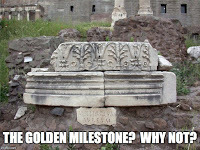 Today "All roads lead to Rome" means a lot of different routes can lead to the same place. Originally it wasn't a proverb; it was the literal truth. The Romans were the best road builders the Western world have ever seen to that point, and all their roads - even those as far away as Britain and Turkey - were measured from the "Golden Milestone" set up in Rome's main market. A Roman road was basically a well-built stone wall buried dozens of feet in the earth so travelers could walk on top of it. They're still around.
Today "All roads lead to Rome" means a lot of different routes can lead to the same place. Originally it wasn't a proverb; it was the literal truth. The Romans were the best road builders the Western world have ever seen to that point, and all their roads - even those as far away as Britain and Turkey - were measured from the "Golden Milestone" set up in Rome's main market. A Roman road was basically a well-built stone wall buried dozens of feet in the earth so travelers could walk on top of it. They're still around.
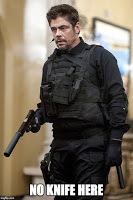 Judas may have been called Iscariot because he carried a sica, a curved short sword that was considered dishonorable by Romans. Because it was light, concealable, and made it easy to carve an unarmored opponent, it was considered the weapon of assassins, cutthroats, and domestic terrorists. Iscariot = knifeman. And these days, sicario still has that meaning, kind of.
Judas may have been called Iscariot because he carried a sica, a curved short sword that was considered dishonorable by Romans. Because it was light, concealable, and made it easy to carve an unarmored opponent, it was considered the weapon of assassins, cutthroats, and domestic terrorists. Iscariot = knifeman. And these days, sicario still has that meaning, kind of.
There.Those are things you know now.Welcome back!
But seriously - I've been rewriting the second novel, working on a sequel to TWS, working on a couple of short stories, not to mention life stuff with which I shall not bore you...
Excuses, excuses.
I'm not completely up to speed yet, so here are some random Rome facts to keep you going:
 The Roman legionary camp was essentially a city that they carried with them and then built wherever they needed it. The plan was unvarying and included a market square, a space for sacrifices, and a giant surrounding wall. Every soldier knew where he bunked in that camp - even when the camp didn't yet exist. It was a model in their minds.
The Roman legionary camp was essentially a city that they carried with them and then built wherever they needed it. The plan was unvarying and included a market square, a space for sacrifices, and a giant surrounding wall. Every soldier knew where he bunked in that camp - even when the camp didn't yet exist. It was a model in their minds.Also, five hundred years after the fall of the Western Empire, and even though their daily language and culture were medieval Greek, the Byzantines referred to themselves as Romans. So did the Muslim world.
The Roman "republic" was really an oligarchy, for the most part. Sound familiar?
 Today "All roads lead to Rome" means a lot of different routes can lead to the same place. Originally it wasn't a proverb; it was the literal truth. The Romans were the best road builders the Western world have ever seen to that point, and all their roads - even those as far away as Britain and Turkey - were measured from the "Golden Milestone" set up in Rome's main market. A Roman road was basically a well-built stone wall buried dozens of feet in the earth so travelers could walk on top of it. They're still around.
Today "All roads lead to Rome" means a lot of different routes can lead to the same place. Originally it wasn't a proverb; it was the literal truth. The Romans were the best road builders the Western world have ever seen to that point, and all their roads - even those as far away as Britain and Turkey - were measured from the "Golden Milestone" set up in Rome's main market. A Roman road was basically a well-built stone wall buried dozens of feet in the earth so travelers could walk on top of it. They're still around. Judas may have been called Iscariot because he carried a sica, a curved short sword that was considered dishonorable by Romans. Because it was light, concealable, and made it easy to carve an unarmored opponent, it was considered the weapon of assassins, cutthroats, and domestic terrorists. Iscariot = knifeman. And these days, sicario still has that meaning, kind of.
Judas may have been called Iscariot because he carried a sica, a curved short sword that was considered dishonorable by Romans. Because it was light, concealable, and made it easy to carve an unarmored opponent, it was considered the weapon of assassins, cutthroats, and domestic terrorists. Iscariot = knifeman. And these days, sicario still has that meaning, kind of.There.Those are things you know now.Welcome back!
Published on March 29, 2019 10:44
January 3, 2019
For Your Consideration: "A Dog of Wu"
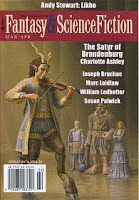 "A Dog of Wu" is up for Hugo and Nebula nominations. It appeared in the March/April 2018 issue of The Magazine of Fantasy & Science Fiction. It's a 7k+ word novelette set in a future of genetic optimization, environmental rebuilding, and clashing philosophies.
"A Dog of Wu" is up for Hugo and Nebula nominations. It appeared in the March/April 2018 issue of The Magazine of Fantasy & Science Fiction. It's a 7k+ word novelette set in a future of genetic optimization, environmental rebuilding, and clashing philosophies.SFWA members can find it here, and WorldCon members can purchase a copy here.
Published on January 03, 2019 07:52
August 25, 2018
California Cray
Well, Conjure Man is off to beta-read, and I'm playing with the sequel, Thin City, which is set in my old stomping ground of Southern California.
California has always had a reputation for the cray: fads in philosophy, religion, politics, lifestyle. I love that stuff. Try something different. Even if you fail, it will be amusing...maybe not to you, but definitely to me. And if you succeed, you've introduced or invented something worthwhile for the entire country. Yoga, drinkable American wines, American cuisine based on fresh food (not burned steak and canned peas), the personal computer - they started out there. (Granted, California also gave us biker gangs, cults, and branded water, so...)
Once leaving the East was no longer a guarantee of personal freedom and the 20th Century monoculture took hold from Maryland to the Great American Desert, California was a bastion of the weird. It's where folks who felt repressed in Hannibal and Toledo came to remake themselves with cheap land and endless sunshine - as far into the sunset as you could go without getting wet. If your notion of freedom was crouching on a piece of real estate behind a shotgun, you became a desert rat in the Mojave. If you were more entrepreneurial, you made it out to Southern California and the Bay Area.
Consider all the F/SF writers born in the Midwest who grew up in or moved to California - Bradbury, Heinlein, Dick, Ellison, Niven, Vance, Kuttner, Moore, Matheson...And the state is littered with the relics of the folks who didn't just write spec-fic: They lived it.
Some of my favorite "relics":
The Winchester Mansion
The Madonna Inn
Hearst Castle
The Integratron
The Self-Realization Fellowship Gardens
The Rosicrucian Egyptian Museum
The Magic Castle
The Solvang Windmills
The Museum of Jurassic Technology
The Henry Miller Library
If you're ever out there...
California has always had a reputation for the cray: fads in philosophy, religion, politics, lifestyle. I love that stuff. Try something different. Even if you fail, it will be amusing...maybe not to you, but definitely to me. And if you succeed, you've introduced or invented something worthwhile for the entire country. Yoga, drinkable American wines, American cuisine based on fresh food (not burned steak and canned peas), the personal computer - they started out there. (Granted, California also gave us biker gangs, cults, and branded water, so...)
Once leaving the East was no longer a guarantee of personal freedom and the 20th Century monoculture took hold from Maryland to the Great American Desert, California was a bastion of the weird. It's where folks who felt repressed in Hannibal and Toledo came to remake themselves with cheap land and endless sunshine - as far into the sunset as you could go without getting wet. If your notion of freedom was crouching on a piece of real estate behind a shotgun, you became a desert rat in the Mojave. If you were more entrepreneurial, you made it out to Southern California and the Bay Area.
Consider all the F/SF writers born in the Midwest who grew up in or moved to California - Bradbury, Heinlein, Dick, Ellison, Niven, Vance, Kuttner, Moore, Matheson...And the state is littered with the relics of the folks who didn't just write spec-fic: They lived it.
Some of my favorite "relics":
The Winchester Mansion
The Madonna Inn
Hearst Castle
The Integratron
The Self-Realization Fellowship Gardens
The Rosicrucian Egyptian Museum
The Magic Castle
The Solvang Windmills
The Museum of Jurassic Technology
The Henry Miller Library
If you're ever out there...
Published on August 25, 2018 09:12
August 24, 2018
This Is Just To Say
I have rejected The storyThat came from your mailserve
and which you had probably hopedwould validate you
Forgive me It was atrociousso trite and so old
and which you had probably hopedwould validate you
Forgive me It was atrociousso trite and so old
Published on August 24, 2018 07:56
March 21, 2018
Hey, Kids! What Time Is It?
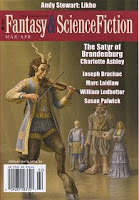 It's time for an author interview!
It's time for an author interview!My interview for Fantasy & Science Fiction is up on their blog, and I am my usual urbane and pithy self. Check it out! (It won't take long.)
And while we're on the subject-
A while back, when I was describing A Dog of Wu to a friend, before I'd written it, she said the worst thing you can say to a fiction writer: "It sounds like..."
In her case, she finished the sentence with "...Brave New World." But my brain heard "...someone else has written your story."
Of course, they hadn't said that. And if you actually read A Dog of Wu (go on, I dare you) you'll see it's nothing like Brave New World. But when you start writing, you're often obsessed with the originality of our ideas: Have that one great idea, your story will be successful, and you'll be off on a career of champagne, caviar, and celebrity pet treats for your dog.
Of course, none of that is true. Hamlet wasn't an original idea; neither was Romeo and Juliet. And wasn't there that musical, West Side...something?
Ideas are ideas. Everybody has them. Originality emerges in execution.
Published on March 21, 2018 10:50
February 23, 2018
Best Author Photo (Not Mine)
Published on February 23, 2018 06:31
February 20, 2018
The Most Important Thing
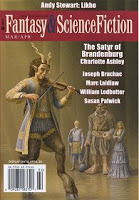 "A Dog of Wu" is in here!
"A Dog of Wu" is in here! #shamelessplugIt seems that my story, A Dog of Wu (appearing in the March/April issue of F&SF) got a mention at Tangent Online: "The author successfully creates a complex future society," they say. I'll take it - especially since, if you think about it, creating a world in 8,000 words is damned hard.
Which is why you shouldn't think about it, if you're a writer. DON'T BUILD A WORLD.
Oh my God. What is he saying? Is he saying that everything should be set in the present, or some easily extrapolated near future? Is he-
Nope-nope-nope. Of course not.
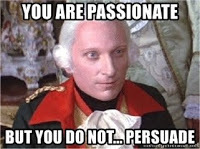 But let's face it: You and I have both read a lot of stories - short, long, and medium - with meticulously worked-out worlds possessed of their own languages, religions, sorceries, technologies, geographies, and ecologies, that somehow just don't work. What makes some thorough, logical universes as dry as dust? What makes an insane, inconsistent universe (e.g. Roger Zelazny's Creatures of Light and Darkness) brilliant and utterly convincing?
But let's face it: You and I have both read a lot of stories - short, long, and medium - with meticulously worked-out worlds possessed of their own languages, religions, sorceries, technologies, geographies, and ecologies, that somehow just don't work. What makes some thorough, logical universes as dry as dust? What makes an insane, inconsistent universe (e.g. Roger Zelazny's Creatures of Light and Darkness) brilliant and utterly convincing?No, really, I'm asking. I have no idea.
Okay, maybe I have one or two-
 The second, I think, is a compelling "Theory of Operation." If you know how the MOST IMPORTANT THING in your story operates, and why, the rest will fall into place. That's why I say "Don't create a world; create a Theory of Operation for your Most Important Thing."
The second, I think, is a compelling "Theory of Operation." If you know how the MOST IMPORTANT THING in your story operates, and why, the rest will fall into place. That's why I say "Don't create a world; create a Theory of Operation for your Most Important Thing."F'rinstance...in most fantasy worlds, the Most Important Thing is magic. If you know how your magic works, and why it works that way, your world is more than half-built. Take Ursula LeGuin's A Wizard of Earthsea. If you've read it, I guarantee you remember the rules of magic. There are only two, after all: The name is the thing. The world's balance can be disrupted by magic. And that's it. Simple...but almost everything emerges from those two principles.
In science fiction, that ToO/MIT is often expressed as What if? What if robots have humanoid
 intelligence, but are bound by three unbreakable laws? What if there's a biowarfare agent that turns its victims into single-minded analysis machines, the ultimate grad students? What if one small group of people have enormously long lifespans that are purely the result of hereditary, and the rest of humanity finds out about it?
intelligence, but are bound by three unbreakable laws? What if there's a biowarfare agent that turns its victims into single-minded analysis machines, the ultimate grad students? What if one small group of people have enormously long lifespans that are purely the result of hereditary, and the rest of humanity finds out about it?If you take a look at those stories, you'll see that the level of worldbuilding detail goes from minimal (Asimov's I, Robot) to enormous (Vinge's A Deepness in the Sky) but they are all successful, because the What If, the ToO, is simple and compelling.
In A Dog of Wu, I didn't create an entire world. I created just enough of a world by focusing on my What If - what if humans were bred like dogs? What would that look like? Why would it happen? How would it work? Who would do the breeding? The rest of the story depended on that. If I had tried to create that world from scratch, instead of deriving it from its most important thing, I would have gone crackers.
You can spend weeks or months or years coming up with languages, races, and geologic processes; but if they don't hold together, they don't matter. If you focus on your Most Important Thing(s), everything else is more likely to fall into place.
That's my theory, anyway. What's yours?
Published on February 20, 2018 12:42
December 19, 2017
It's Official!
 My short story, "A Dog of Wu," will appear in the March/April 2018 issue of The Magazine of Fantasy and Science Fiction. Yay!
My short story, "A Dog of Wu," will appear in the March/April 2018 issue of The Magazine of Fantasy and Science Fiction. Yay!I don't know if I can convey just how cool this is to me. F&SF has been one of the great speculative fiction magazines for more than 60 years. It's the biggest of the Big Three: F&SF, Analog, and Asimov's. This isn't to knock the great newer zines/sites like Clarkesworld and Beneath Ceaseless Skies, but F&SF is OG. My dad read it. And the authors! Ray Bradbury and Roger Zelazny, Robert Heinlein and Fred Pohl, Stephen King and Fritz Leiber and Harlan Ellison and Alfred Bester and Damon Knight...
A Rose for Ecclesiastes. Flowers for Algernon. In the Country of the Kind. Born of Man and Woman. My God, what stories. What great company.
So...happy dance!
(NB - I would have used an old cover of F&SF for the image, but I don't want anyone looking for *that* cover for my story, and not finding it...)
Published on December 19, 2017 14:16
August 27, 2017
If You're Looking to Help-
- the Hurricane Harvey relief effort, Vox has a useful article.
Published on August 27, 2017 19:09
August 26, 2017
This Is Science Fiction
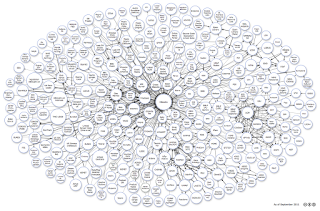 I often say that science fiction isn't about the new - it's about how we respond to the new. Whether that new thing is a technology, a scientific discovery, an alien race, or something, what is most important is how we respond to it. How we make use of it, run from it, exploit it, adapt to it. Some of the stories that I like best are extrapolative - they take the new thing and explore all the possible ways we might react.
I often say that science fiction isn't about the new - it's about how we respond to the new. Whether that new thing is a technology, a scientific discovery, an alien race, or something, what is most important is how we respond to it. How we make use of it, run from it, exploit it, adapt to it. Some of the stories that I like best are extrapolative - they take the new thing and explore all the possible ways we might react.Thirty years ago, this article from Salon.com would have been brilliant science fiction. In it, an editor named Andrew Kahn goes after Michiko Kakutani, the Great White Whale of New York literary criticism. But instead of doing it with mere assertion and snark - the traditional weapons of belletristic warfare - he used digital humanities. He used software to analyze Kakutani's prose style and her choice of reviewed books. Instead of just saying Kakutani had a limited prose style and a decided preference for some types of books over others, he tried to prove it statistically.
He didn't use enormous processing power to find new elementary particles (after all, there are already people doing that); he used it to argue. A brilliant, science-fictional approach to the new. I wish I had thought of it.
Published on August 26, 2017 06:46




